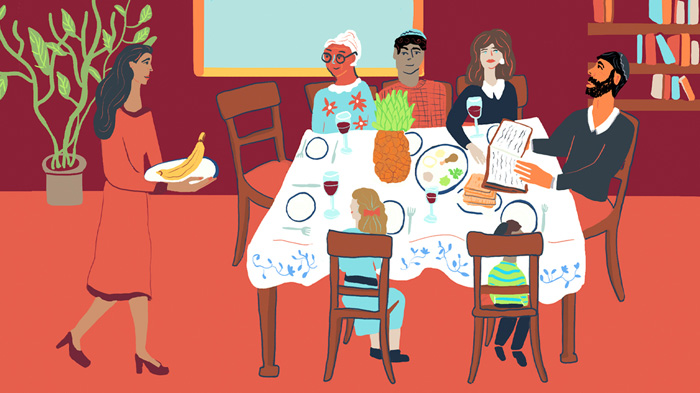Holidays
Passover
Passover and the Power of a Well-Placed Banana
When I first caught sight of the banana on the seder plate at a Passover seder I attended a few years ago, it took considerable self-restraint to keep from rolling my eyes.
I’ve had mixed experiences at seders. I appreciate the point of them, which is to gather with loved ones over a meal and retell the story of the ancient Israelites’ journey from slavery in Egypt to liberation. I also appreciate how the script we use to tell that story, the Haggadah—which dates back to the third or fourth century—includes all kinds of texts and rituals to make the story come alive: songs to sing, questions to ask and symbolic foods to eat, which are set out on a special seder plate.

And I appreciate the effort many Jews put into creating memorable seder experiences. I know of one couple who had their guests re-enact the Exodus story, complete with elaborate costumes and an attempt to transform the avocado tree in their yard into a burning bush. Another friend spends months each year preparing special effects for her family’s seder, including setting up a bubble machine to re-enact the splitting of the sea and hanging plastic locusts from her ceiling fan, which, when switched on, creates a swarm during the part of the seder where we list the 10 plagues.
But while I have nothing against seder innovation—recent trends have included adding an orange to the seder plate to represent the struggles of women and LGBTQ people, or an olive to symbolize aspirations for peace in the Middle East—at some point, things can get out of hand. I suspected the banana might be that point.
This seder, however, turned out to be lovely. The hosts had created their own Haggadah, filled with moving poetry and thoughtful quotes. The guests were from a fascinating array of backgrounds and faiths. And the whole thing was proceeding along at a heartening clip as we went around the table, each reading a section of the Haggadah…until we reached a page entitled “The Banana on the Seder Plate: A Ritual to Reflect on the Refugee Crisis During the Passover Seder,” and the guy whose turn it was started reading:
The world was awakened and shattered by the images of a little boy whose body lay lifeless amidst the gentle surf of a Turkish beach…. Another nameless victim amongst thousands in the Syrian Refugee Crisis, the greatest refugee crisis since WWII. But this little boy, like every little boy, had a name. His name was Aylan Kurdi (age 3), he drowned along with his older brother, Galip (age 5), and their mother, Rihan, on their own exodus to freedom’s distant shore.
As he came to the next paragraph, his voice grew tight:
Aylan and Galip’s father, Abdullah, survived the harrowing journey—though how does a parent survive the death of their children? In teaching the world about his sons, he shared that they both loved bananas, a luxury in their native war-torn Syria. Every day after work, Abdullah…would bring home a banana for his sons to share, a sweet little treat, a sign of his enduring love for them. Tonight, we place a banana on our seder table and tell this story to remind us of Aylan, Galip and children everywhere who are caught up in this modern-day exodus.
The previously boisterous table had fallen silent save for the rustling of people reaching for their napkins to wipe their eyes. We had all seen the photograph of that little boy’s lifeless body, face-down on the beach. It had been in the news for days, along with other stories of people fleeing Syria in rickety boats.
At that moment, I finally understood: This is the kind of heartbreak and outrage that the bitter herbs and haroset are supposed to make us feel. This is the kind of terror and desperation the Haggadah is trying to conjure with its imminent, personal language: telling us not that “your ancestors were slaves in Egypt,” but that “you were slaves in Egypt.”
It’s hard to evoke the suffering caused by events that may have taken place thousands of years ago with symbolic vegetables. But this Haggadah and that banana had nailed it. Ironically, the object that least belonged on the seder plate had breathed life into all the others, helping those traditional items fulfill their intended purpose. It had even rendered the saltwater unnecessary; there were real tears at this seder table.
This is what Jewish holidays are supposed to do: move us, inspire us, challenge us and shake us up. And sometimes, all it takes is a well-placed banana.
Sarah Hurwitz was the head speechwriter for former First Lady Michelle Obama.
Excerpted from Here All Along: Finding Meaning, Spirituality, and a Deeper Connection to Life—in Judaism (After Finally Choosing to Look There), by Sarah Hurwitz. Copyright © 2019 by Sarah Hurwitz. Excerpted by permission of Spiegel & Grau, a Penguin Random House Company. All rights reserved. No part of this excerpt may be reproduced or reprinted without permission in writing from the publisher.











 Facebook
Facebook Instagram
Instagram Twitter
Twitter
Marthajoy Aft says
Powerful! Thank you.